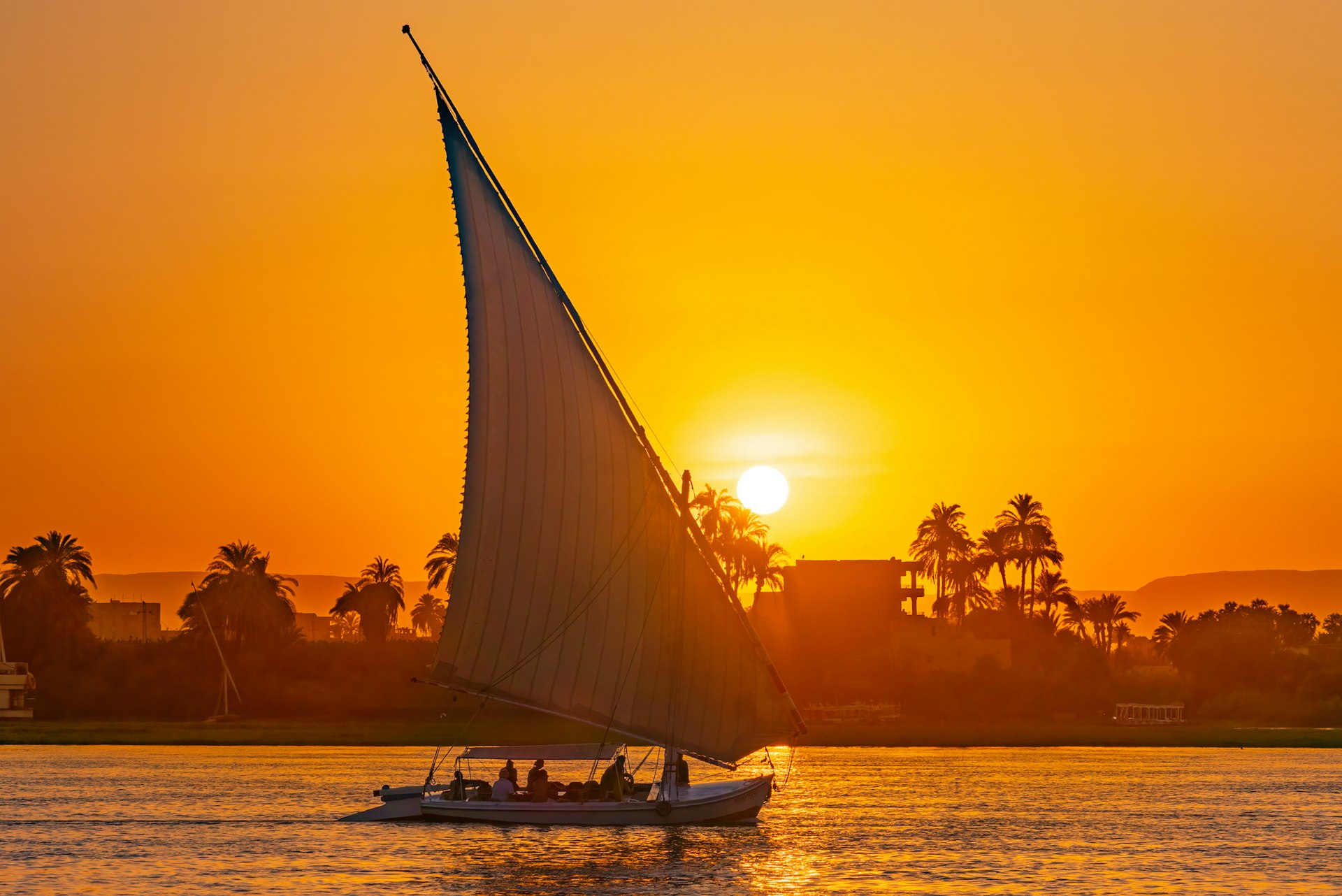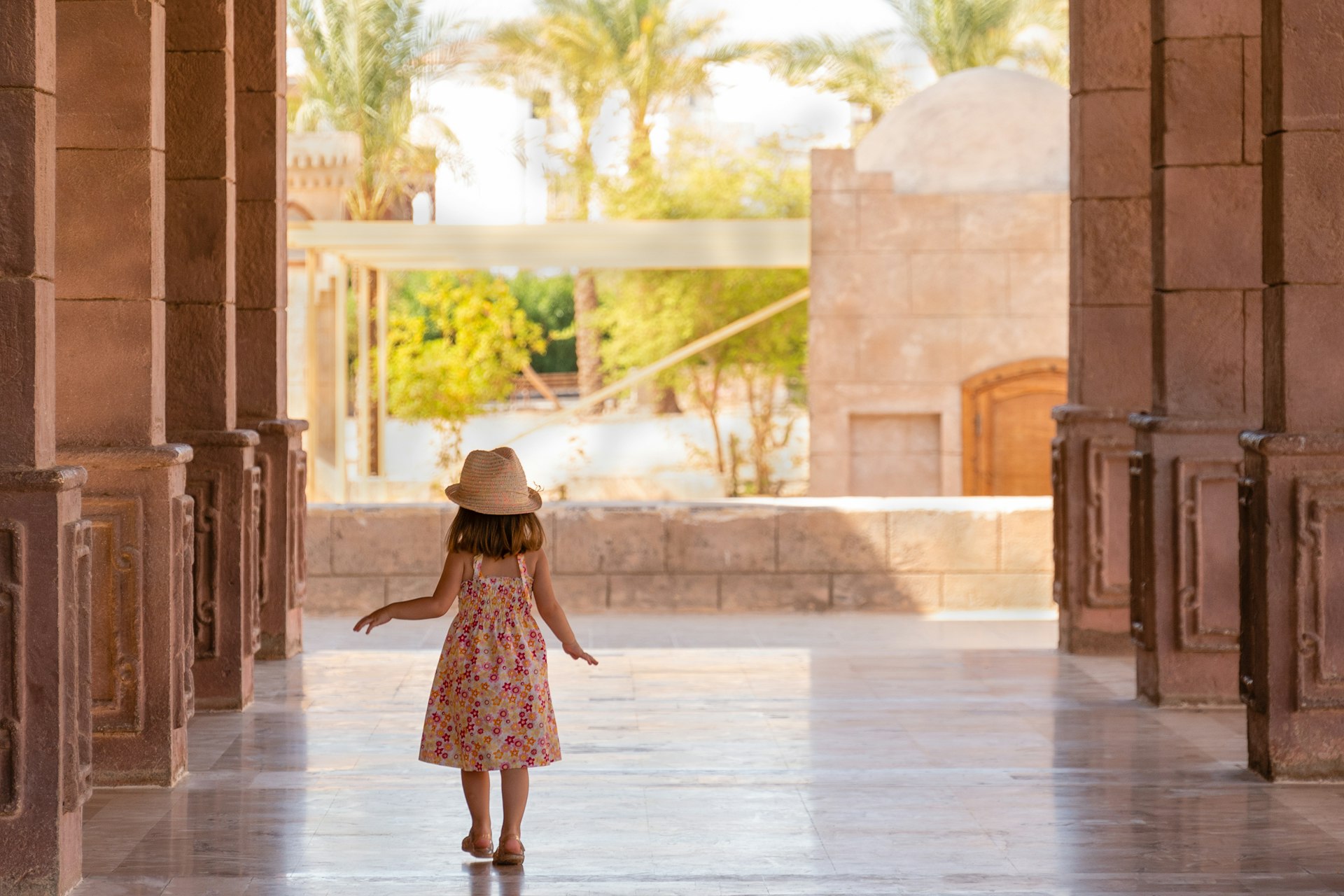Piling onto a tractor-trailer, an assortment of Luxor youngsters leaned into a conversation with a pair of retirees from Europe. “We’re learning English,” the youngest said, unabashed by any lack of formal introduction. A tumble of questions followed: “Where you from? You like Luxor? How many kids you have?”
Unphased by the fact that the couple’s children were now parents in their own right, the eldest piped up, “Where are they? Why they not with you?” Leaving the question hanging in the air, the kids darted off to the weekly Talaat market to find their own folks among the stalls of tomatoes and oversized cabbages.
Family in Egypt, where more than 50% of the population is under the age of 25, dictates the very shape of life. Being with family members is so important that, for many Egyptians, it’s inconceivable that anyone would want to take a vacation without them, no matter their age. This gives visitors with kids an instant point of connection.
In fact, for those ready to have their kids picked up, cuddled and cooed over, traveling anywhere in Egypt is that much more memorable for the interactions that children invite and for the extra sense of welcome afforded to families.
Egypt can be a challenge with kids, but it reaps big rewards
With large crowds, long lines, excessive summer heat and little shade, visiting Egypt is demanding for much of the year, especially for small children who run a higher risk of sunburn and heat exhaustion. Plus, parents have to contend with the difficult terrain for strollers and the lack of clean public bathrooms (or bathrooms at all).
Thankfully, these challenges can be lessened by avoiding the summer and peak tourist seasons; balancing indoor and outdoor activities; packing hats, reusable water bottles and a mosquito net; and knowing where to buy a Cairo Pass or Luxor Pass to avoid waiting in lines.
But is it worth it? A trip to Egypt offers unforgettable, world-class experiences. School curricula give at least a nod to the ancients, so the chance to get up close to a pyramid or descend into the tomb of a pharaoh is a fantastic way to make history come alive. Encountering traditional hospitality in an Islamic country is a great way to challenge negative perceptions about the Middle East and offers opportunities to form lifelong friendships across cultural divides.
Egypt’s Red Sea coast is particularly well set up for a family beach vacation, with excellent facilities for learning new skills such as snorkeling, diving and windsurfing, while older kids can learn that the desert is not deserted through trips with the Bedouin.
Choose where to visit – don’t try to visit all of Egypt at once
All the main attractions in Egypt can easily be negotiated with the family – but not all in one trip! Being selective is key. Rather than trying to cover too much in a single visit (the quickest route to cultural overload), it’s better to choose two or three destinations that offer contrasting experiences.
A Cairo visit combines well with a few days at a Red Sea resort, while a Luxor visit can be enjoyably followed by a Nile cruise to Aswan. Alternatively, spending the whole trip in laidback Luxor offers a great introduction to Egypt without the challenges of navigating the capital. A focus on Sinai similarly offers sea and sand with some inland adventure on a shorter trip and with the benefit of a Sinai-only visa.
Go for gold among Cairo’s capital attractions
Yes, it’s real gold and there’s an awful lot of it among Tutankhamun’s treasures in the Egyptian Museum in Cairo. Keep kids guessing about the pharaohs by visiting the Pyramids of Giza, the famous burial site of Tutankhamun’s ancestors. Brave young explorers will want to get to the heart of the adventure by climbing inside the Great Pyramid, one of the seven wonders of the ancient world and the only wonder to have survived the passage of time.

Look for Nemo in the Red Sea
The beauty of Egypt’s Red Sea coast is that it’s easily accessible, the water is crystal clear and the underwater world teems with tropical fish that will enthrall even the youngest of swimmers.
Head to Hurghada or Sharm El Sheikh where many of the resorts cater for families, with patrolled sandy beaches and kids’ entertainment for toddlers. Most have dive centers offering beginner courses for older children.
Avoid the curse of the mummy in Luxor’s Valley of the Kings
Everyone loves a story, and the ancient necropolis at Thebes, on the west bank of the Nile in Luxor, has more than its fair share of them. One of the best tales is true: imagine finding treasure in a hidden chamber, buried within a hillside in a place where no one has thought to look!
This was the life’s work of Howard Carter, who found the tomb of Tutankhamun in the Valley of the Kings 100 years ago. Budding Egyptologists can wander around Carter’s House before visiting the tomb of the young pharaoh nearby.
Wondering how the bodies of Tutankhamun and his fellow ancients were preserved? Stop by the Mummification Museum on Luxor’s east bank and kids are likely to spot the cranial scoop and jars of innards before their accompanying adults.
Teens can study ancient hieroglyphs at the Theban Community Library (or Theban Mapping Project phone app) and share what they discover with the rest of the family.
Get on the water on a Nile cruise
Taking a Nile cruise rocks babies to sleep, while older tots can spot birds with big beaks, like ibis, herons and kingfishers. Linking Cairo with Luxor and Aswan, the Nile is the world’s longest river and a natural history lesson for geography-savvy youngsters.
In each cruise destination, look for Egypt’s famous sound-and-light shows: babies in arms love being bathed in their color and music, while their older siblings gain bite-sized history lessons. Two of the best are at the Temple of Karnak in Luxor and Abu Simbel in southern Egypt.

Find alternate modes of transportation
There are tons of interesting ways of getting around Egypt, and it’s a great place for kids to cut their travelers’ teeth. Forget internal flights and use the revamped overnight trains from Cairo to Luxor. Hop aboard a felucca (a traditional sailboat) or a water taxi between the banks of the Nile.
Youngsters may like sitting up front with the driver of a horse cart in Luxor or Edfu. Looking down from camel height at Aswan’s Tombs of the Nobles makes a five year old feel like they’re 15.
Four legs (and one hump) still beat four wheels when it comes to gaining traction in soft sand, and the camel ride in Giza is a traveler’s classic.
If that’s too much movement, how about spending a week reading a book with the owners of Luxor Stables while the little ones take care of the horses?
Is the Cairo Pass or Luxor Pass worth it?
Entry to sites of interest is free for children under the age of six while half-price tickets are available for students. If you’re planning to stay in one place for a few days, consider buying the all-inclusive Cairo Pass or Luxor Pass, which saves lining up for tickets each day.
